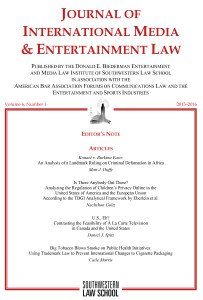SWLAW Blog | Faculty Features

May 27, 2016
Entertainment Journal Enters New Phase with Wide-Ranging New Issue
Volume 6, Issue 1 of the Journal of International Media and Entertainment Law (JIMEL) has been published and covers a wide range of topics, including journalists’ rights over those of public figures in Africa, children’s privacy online in Europe and America, the cable industry’s struggle to stay competitive in Canada while satisfying consumer demand, and how tobacco companies are attempting to use trademark law globally to thwart mandatory health warnings.
Professor Michael Epstein, the Journal’s editor, also announced Southwestern’s upcoming symposium, Freedom of Information Laws on the Global Stage: Past, Present and Future, to be held on November 4, 2016 in Los Angeles. This conference is timed to commemorate the 250th anniversary of Sweden’s freedom of information law—the world’s first—and the 50th anniversary of the U.S. government’s Freedom of Information Act (FOIA). Scholars from every continent but Antarctica will be coming to campus to discuss access to government information and sunshine laws in a global context. Papers will be published in JIMEL and in the Southwestern Journal of International Law. Information about speakers and topics can be found at http://www.swlaw.edu/globalFOIconference.
This issue’s lead article, “Konate v. Burkina Faso: An Analysis of a Landmark Ruling on Criminal Defamation in Africa,” by Matt J. Duffy, assesses the significance of the rare case, in the African Court of Human and People’s Rights, in which the judicial body upheld the rights of journalists over those of public figures. Duffy, a professor at Kennesaw State University, is a prolific scholar of journalism in print and online.
In his article, “Is There Anybody Out There? Analyzing the Regulation of Children’s Privacy Online in the United States of America and the European Union . . . .” Nachson Goltz, a scholar at Osgoode Hall Law School at York University in Canada, offers a carefully calibrated analysis of regulation of children’s privacy online. Goltz uses Eberlein et al.’s Transnational Business Governance Framework to critique the commodification of personal information collected in the United States of America and the European Union.
Daniel Spitz, an emerging scholar with a transnational entertainment law practice, dissects the growth of subscription video on demand (SVOD) and the transition to non-linear television viewing in both countries in “Contrasting the Feasibility of À La Carte Television in Canada and the United States.” He concludes that hybrid basic tiers with optional à la carte services may strike the balance between the needs of the cable industry and consumers in an increasingly fragmented marketplace.
Rounding out this issue is Caile Morris’ “Big Tobacco Blows Smoke on Public Health Initiatives: Using Trademark Law to Prevent International Changes to Cigarette Packaging.” Morris, a Law & Policy Fellow at the Association of Research Libraries, frames the U.S. public health debate about cigarette warning labels in light of global battles over trademark and branding related to cigarette packaging.
Professor Epstein also announced that, beginning with this issue, the Journal will be published by the Donald E. Biederman Institute at Southwestern Law School, in association with the American Bar Association’s Forum on Communications Law and the Forum on the Entertainment and Sports Industries.
“Other than some changes in the Journal’s front-matter, the content of this issue, and our mission going forward, remain the same,” Epstein writes. “Indeed, I look forward to continuing input and feedback from a broad range of Journal subscribers, including those in both of our constituent ABA Forums.”
The leading faculty-edited publication of its kind, JIMEL was established in 2005 by the American Bar Association and Southwestern Law School to promote scholarship focused on all aspects of international, domestic, and comparative law in media and entertainment. Contributors include top scholars and practitioners from around the world.